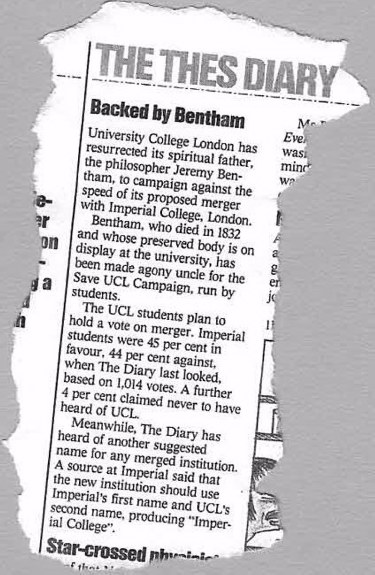 Opposition ends Imperial and UCL merger dream Opposition ends Imperial and UCL merger dream
Guardian, 18th November
Donald MacLeod
Monday November 18, 2002
The proposed merger between Imperial College and University College London has been called off after running into intense opposition from academic staff, sources revealed today.
Today's shock news, killing off the idea of a London super-university to eclipse Oxford and Cambridge, is a bitter blow for the two principals who launched the plan last month.
A furious Sir Derek Roberts, acting provost of UCL, lashed out last week at the "hypocrisy" and "lies" of opponents among academic staff, who have campaigned vigorously against the plan he put forward with Sir Richard Sykes, rector of Imperial College.
A terse statement from the provost's office said: "UCL and Imperial College have now completed an intense period of deliberation since it was first announced that the two colleges were exploring the desirability and feasibility of merger between the two institutions. A number of areas for future collaboration have been identified; the overall conclusion is that the best interests of the two institutions are not served by a formal merger. UCL is now recommencing its search for a new provost from October 2003. Once in post, the new provost and the rector of Imperial College may well continue discussions on developing the opportunities for collaboration identified in the last five weeks."
 Merger between the two institutions would, the two vice-chancellors argued, have created potentially the greatest university in the country, attracting more research funding than Oxbridge and competing with global giants like Harvard. But opponents argued the merger was a takeover by Imperial and raised fears of redundancies.
Sir Derek admitted his efforts to persuade staff had not gone well. "An enormous amount of antipathy and ill-feeling has been generated by various groups. I am quite disgusted and amazed at some of my colleagues," he said bitterly.
He said opponents had used deliberate scare tactics, such as suggesting all the physical sciences would be moved from UCL's Bloomsbury site to Imperial. "That's an absolute lie - there has been no such decision and the whole idea is ludicrous," he said.
"This fantastic opportunity to create not only an outstanding institution in London and the UK, but something that has a chance of operating in the world league of teaching and research has a fair chance of being thrown away because of the bias and ill-informed views that have influenced people without wanting to explore the facts.
"If that's the case, I shudder to think of the problems they are going to have in finding a new provost for UCL. It will not be attractive to someone good."
A committee for UCL was formed to fight the merger plan when it was unveiled last month, and opposition conducted via two websites - www.cucl.org and saveucl.net - have kept up a brisk fire of criticism. Sir Richard, whose record in merging Glaxo with SmithKlineBeecham where there were subsequent redundancies among research staff, has been particularly attacked. His enthusiasm for the merger is known as "Sykomania" in some UCL circles.
The website attacked what it called a "grandiose and risky experiment", saying: "The motivation we all share is concern that the present headlong rush for a shotgun marriage, without proper time for consultation and consideration, could prefigure a disaster, not only for UCL and Imperial, but for university education in the UK as a whole."
Professor David Colquhoun, a leading member of the anti-merger committee, said Sir Derek had lost the battle to win over staff to the proposal, and opinion in the college is overwhelmingly hostile. "He is not in a position to give any reassurances. He will be gone by next summer. Sir Richard Sykes will be in charge and there will be no-one to ensure these agreements are fulfilled."
Next week, opponents had been due to table a motion at a meeting of the UCL academic board condemning the merger and calling on the college to resume the search for a new provost - had the merger gone ahead Sir Richard would have headed the combined institution.
|
